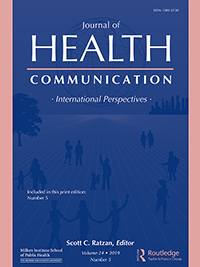 Abstract
Abstract
Content analysis identified three dominant themes used by the news media to cover epidemics: the scientific, the pandemic, and the social. This study uses a randomized experimental design to test the effects of common news coverage patterns of epidemics on perceptions of efficacy, certainty, and trust in the CDC, and subsequently on intentions to comply with and support for the CDC during public health crises. The experiment also compares the effects of real-world coverage to that of hypothetical coverage that more closely follows the CDC’s recommendations for crisis communication. The results of the experiment (n = 321) demonstrate that exposure to articles from different themes affects perceptions of certainty and self-efficacy, that in turn affect intentions to comply with the CDC. Although organizational-efficacy and trust in the CDC are both correlated with intentions to support, and trust is also correlated with intentions to comply, exposure to different conditions did not affect these perceptions and there was no indirect effect from exposure to intentions. The results reveal the potential effects of real-world coverage on perceptions and intentions, and demonstrate the advantage of the hypothetical coverage that follows the CDC’s crisis communication guidelines. Implications for public health organizations and communicators are discussed.
Authors
- Yotam Ophir

